
How many alarms should you set?
There are two kinds of people: those who immediately wake up in the morning and others who wake up only after multiple alarms.
The people who hit the snooze button about six times or have to set several alarms at strategic points around the bedroom to make them get up would probably say of themselves that they are not morning people.
However, it’s not as simple as that. How you sleep at night and your morning wake-up call can have a marked effect on your day. The impact of your morning alarms can be far-reaching, with the general consensus being it’s not a good idea to set multiple alarms.
How many alarms should you set?
The answer is just one, because setting multiple alarms to wake up may actually be harmful to your health. Despite almost one-third of adults saying they hit the snooze button over and over again, as they feel deprived of sleep, this makes you feel worse.
The adults surveyed said they got less than seven hours’ sleep a night and always felt tired. Hitting the snooze button multiple times made them think they would grab a few extra minutes’ sleep before finally having to get up. However, they couldn’t understand why this still left them feeling sluggish.
The problem is you’re not really resting, or sleeping well, between the alarms. This is because the most restful parts of your sleep cycle have already happened by this time. Imagine you’re trying to reverse the whole sleep cycle in the space of about five minutes. It just doesn’t work. It doesn’t lead to restful slumber and doesn’t give your body the time it needs to wake up.
Trying to go back to sleep with the snooze button, only to be awoken again five minutes later, is confusing your body and brain. It isn’t part of your sleep cycle and hence it does no good whatsoever.
What do the experts think?
Although we’re all different, generally speaking, setting several alarms is not recommended. Our brain is healing and “re-setting” during deep sleep. Angela Bradley, the principal psychologist at the Mood and Mind Centre, describes “multiple alarm episodes” as causing unnecessary disruption to these natural processes.
We are repeatedly drawn out of the more productive, deeper stages of sleep when our brain is “filing” the previous day’s memories and activities. Depriving our brain of this important activity leaves us feeling “confused and scrambled”, according to Bradley.
Rather than pressing the snooze button every five minutes for half an hour, just set the alarm for 30 minutes later and enjoy a longer sleep without disruption. This will help your energy and mood during the day, research has shown. You’re not actually getting any more sleep when you stagger your wake-up process.
The Sleep Health Foundation reinforces these views. It explains how multiple alarms repeatedly cause the brain to start waking up and then settle again, only to be disturbed five minutes later. The repetitive awakenings disrupt sleep quality and are the most inefficient way of trying to get extra sleep.
What impact does this have on your working day?
The average adult needs seven-and-a-half to eight hours’ sleep a night to function efficiently during the day. However, the average amount of sleep is only seven hours, with some people having much less than this. This means many of us have had enough sleep to function, but not to give our optimum performance.
Unfortunately, this is a vicious circle, as we spend the day feeling tired and struggling to keep up. However, we will probably do the same routine the following morning, setting and re-setting the alarm, getting off to a poor start again and continuing the cycle of poor sleep.
While missing out on just 30 minutes’ sleep per night might not seem a lot, when you’re doing this all the time, you’re losing almost four hours’ sleep a week. It adds up and you start to feel worse the longer this pattern continues.
Many bodies of research have cited the negative impact a lack of sleep has on our performance at work. It reduces alertness and performance, which impairs your memory and reduces your ability to retain information, think and process your thoughts.
The worst-affected group is women aged between 35 and 55, according to research. This group is more likely to be juggling work and family life, without leaving enough time for personal needs. The effects of sleep deprivation can feel much worse when you’re exceptionally busy and trying to manage several aspects of life.
If you lose just 90 minutes’ sleep one night, this can mean a reduction of around 32% in daytime alertness. Not only will it reduce your productivity at work; it can also lead to poor quality of life in general. Participating in any activities that require sustained attention can become more difficult.
If you work for a large corporation, in an open-plan office, you may be able to get away with sitting in a corner at your desk, consuming large amounts of coffee – although this isn’t ideal!
However, if you’re a freelance worker, an entrepreneur or a lone company director, there’s nowhere to hide. Your business depends on you to be on the ball, so feeling continually below par will eventually cause your company to suffer.
If you work in a coworking space, where you’re surrounded by lots of like-minded, talented individuals, collaboration and productivity are the key to your success. Why risk damaging this for an extra few minutes’ disturbed sleep every morning? It’s far better to set the alarm slightly later, have a little more continual sleep that is more beneficial and then get straight out of bed as soon as that first alarm goes off.
Have a shower, leave yourself time to have a coffee and a healthy breakfast and set off for work in good time. This is a much more efficient way of managing your time in a morning. It won’t leave you feeling tired, fuzzy-headed and moody before you even start.
© leungchopan / Adobe Stock



